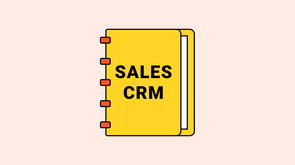Optimizing CRM effectiveness
The primary goal of any CRM system is to streamline the sales process, improve customer engagement, and drive sales.
A CRM audit helps evaluate whether your tool is achieving these goals. This audit identifies areas for improvement and ensures that your CRM is working in alignment with your goals.
Identifying data quality issues
The most critical aspect of any CRM system is data management. A CRM audit checks for inaccuracies, duplicates, or outdated data.
Ensuring your CRM contains high-quality data is vital for accurate reporting and data-driven decision-making.
Enhancing user adoption
Even the most powerful CRM system will fall short if employees aren't using it effectively. A CRM audit reviews how employees interact with the system and identifies barriers to full adoption.
For example, employees may not use the CRM due to a lack of training or a poor user interface.
Ensuring compliance
As data privacy regulations like GDPR become more stringent, ensuring your CRM system complies with the necessary laws is critical.
A CRM audit helps ensure that sensitive customer data is securely stored, managed, and processed, minimizing the risk of compliance violations.
Improving integration and automation
Most businesses use multiple tools for various sales operations, marketing, customer support platforms etc.
A CRM audit record assesses how well your CRM integrates with the other tools and automates processes like lead tracking or follow-up emails.
Measuring ROI
Regular CRM audits and reviews allow businesses to measure their CRM ROI.
Businesses can determine if their CRM implementation delivers the expected results by reviewing customer retention, sales forecasting, and operational efficiency metrics.
Streamlining business processes
Over time, business processes evolve, and so should your customer relationship management system. A CRM audit helps identify inefficiencies in workflows, gaps in functionality, or underutilized features.
Businesses can refine processes to improve departmental efficiency and performance by pinpointing these issues.
Achieving long term growth
A CRM audit isn't just about fixing current issues; it's also about future-proofing your system. Audits provide insights into how your CRM can evolve to support your business as it grows.
Whether scaling the system to handle more data or introducing new features to meet shifting business goals, an audit CRM helps ensure continued support for your long-term objectives.
Multiple types of CRM audits for your business!
Over 60% of businesses prefer mobile-friendly CRM tools for enhanced flexibility and response. That's why, for such an adaptive market, you need multiple types to audit CRM integration to know the change required in the system:
1) Data quality audit
A data quality audit involves reviewing the accuracy, completeness, and consistency of the information stored in your CRM. It includes identifying duplicate, outdated records, validating customer details, and ensuring customer segmentation is effective.
For example, if customer contact information is outdated, it can lead to missed sales opportunities or ineffective marketing campaigns.
2) CRM usage review
This type of CRM audit focuses on evaluating how effectively employees use the system. It includes analyzing user adoption rates and identifying inactive accounts.
For instance, if only half of your team logs into the CRM platform regularly, it may indicate usability issues or a lack of training.
3) Purpose alignment audit
The purpose alignment audit examines whether the CRM system aligns with current business goals and workflows. It assesses whether processes like automation and integrations are serving their intended purpose.
For example, if a marketing integration isn't lead generation as expected, adjustments may be needed to align the CRM with strategic objectives.
Streamline your sales with effective lead management!
Salesmate can help you take control of your leads and improve conversion rates with a powerful lead management system.
4) Compliance checkup
This audit ensures that your CRM adheres to regulations such as GDPR or HIPAA. It involves reviewing data security measures like encryption, user access controls, and backup protocols.
For example, if sensitive customer data is not adequately protected, it could result in legal penalties or breaches.
Free CRM audit checklist to optimize your business!
CRM audits are crucial for evaluating whether your CRM system remains relevant to your business needs. Here is the free CRM audit checklist to optimize the business:
1) Define your objectives
Before diving into the audit, knowing what you want to achieve is essential. A clear objective helps focus the audit on areas that need improvement.
If your goal is to improve data quality, your audit will focus on finding and eliminating duplicate or outdated customer records.
2) Involve your team
Multiple people across the organization use your CRM, so their insights are invaluable. Involving your sales team helps identify problems you may not see and highlights opportunities for improvement.
3) Prioritize the audit areas
Prioritize tasks based on your objective and resources to ensure you focus on what will have the most impact.
If your goal is improving data quality, prioritize cleaning up customer records (deleting duplicates) over minor user interface tweaks.
4) Celebrate improvements
Every improvement, whether big or small, deserves recognition. Celebrating wins keeps the sales reps motivated and reinforces the positive impact of the audit process.
After removing redundant fields in the CRM, your team saves hours each week. Celebrate this success by thanking the team and highlighting the change with improved efficiency.
5) Commit to continuous growth
Make CRM audits a regular business routine to optimize your system. After completing the audit, set a gentle reminder to review your CRM every six months to ensure it evolves with your business needs and customer expectations.
CRM audit part I: Evaluating the usage for optimal performance
Evaluating how effectively your team uses your CRM is a crucial first step in your CRM audit.
The success of a CRM system isn't just about having the software in place. It's about how well it's utilized by the people who interact with it daily.
Here's how to evaluate CRM usage to ensure optimal performance:
Assess CRM adoption across teams
One of the first things to check is how many employees actively use the CRM.
If 50% of your team engages with the system, the data in the CRM may be incomplete or inaccurate.
High user adoption is the key to getting reliable insights and making the CRM work effectively for your business.
Track CRM engagement metrics
Reviewing the CRM's usage metrics can help you understand how much value your team gets from the system.
Look at how frequently your team logs activities, such as calls, emails, meetings, and deals.
This will give an insight into whether your CRM is being used regularly or if there are areas where customer engagement could be improved.
If there's a discrepancy between deals recorded in the CRM and actual sales closing, it may indicate poor data logging by team members.
Consistent usage across departments
The CRM should be used across multiple teams, from sales to marketing to customer support. Check how different departments are interacting with the system.
If certain teams aren't fully utilizing the CRM, it can lead to inefficiencies, missed opportunities, and inconsistent customer data.
This lack of integration means you're missing out on a holistic view of the customer journey and may be working with incomplete data.
Double check for updates
CRMs frequently release updates to improve functionality and add new features. It's important to ensure that your team knows these updates and uses the latest features to their advantage.
A CRM audit should include checking whether your team is up to date with the CRM's capabilities, as new features may improve workflow and performance.
Regularly reviewing and communicating new updates ensures your CRM is optimized.
Investigate inactive features
During the audit, take note of any CRM features that are not being used. These features may be underutilized because employees are unaware of them, find them difficult to use, or don't see their value.
Identifying these underused features allows you to train your team, improve workflows, and unlock more value from the system.
Gather user feedback
While data metrics are valuable, gathering feedback from the users is essential.
Employees who use the CRM regularly can offer insights into usability issues, sales challenges, or gaps in the system.
After surveying your team, you may learn that your sales reps find the CRM's user interface difficult to navigate or that the data entry process is too time-consuming.
Measure ROI
Assess the impact that CRM has on your business's performance.
Are sales teams meeting their targets?
Is customer support resolving issues faster?
Are marketing campaigns generating the expected results?
Evaluating these CRM ROI metrics like customer acquisition cost helps you determine if your CRM delivers value and where adjustments may be needed.
CRM audit part II: Assessing data quality for better accuracy
Data quality is paramount for making informed business decisions, driving effective customer interactions, and maintaining smooth operations. Here's how to design a CRM audit template for accuracy:
Remove unused data
Over time, your CRM may accumulate outdated or irrelevant data. This clutter can hinder navigation and reduce system performance.
If your CRM data quality is poor or contains outdated information on former customers, it's time to remove or archive that data.
Examine data segmentation
Effective data segmentation is essential for making sense of large datasets. Segmenting your data properly allows for more refined insights, targeted communication, and better decision-making.
If you're segmenting your customer database only by location, but your business also requires customer segmentation by product preferences or engagement level, this could limit the potential of your CRM.
You should introduce more filters or create custom fields to track additional data points.
Clear up redundant data
Redundant data, such as duplicate contact entries, can cause significant issues in CRM accuracy. It may lead to multiple communications being sent to the same person or misreporting metrics.
During the CRM data audit, you must identify and merge duplicate entries to ensure data consistency and avoid confusion.
Check for missing data
Incomplete data can hinder your ability to understand customer behaviors and preferences.
Missing crucial information such as contact details, lead stages, or previous interactions can leave gaps in your CRM system, rendering it less effective for decision-making.
If your CRM is missing key information about a lead, like their preferred method of communication, you might miss personalized follow-ups.
Similarly, not tracking a customer's current stage in the sales funnel could result in inefficient communication or lost business data.
Ensure data is up-to-date
To make accurate decisions, your CRM data collected must reflect current information about your customers, leads, and interactions.
If a customer changes their address or job title or their contact information becomes invalid, updating those details in the CRM is important.
Create a CRM data management process
After auditing your CRM data, the next step is implementing a structured data management process that keeps your data organized, clean, and relevant.
This process should outline when and how data will be entered, updated, and cleaned.
You may discover that certain fields are often incomplete or that your team isn't regularly cleaning up outdated records.
That's when having a consistent process ensures long-term data quality.
Salesmate: The ultimate suite for your business!
Salesmate CRM can assist in CRM audits by providing several features that help streamline processes, identify bottlenecks, and optimize workflows. Here are key features tailored for businesses of all sizes from small startups for enterprises:
- Contact management: Get a 360-degree view of all contact data to track conversations and activities.
- Marketing automation: Gain smart automation for your marketing team to nurture leads, generate prospects, and conduct campaigns effectively.
- Sales automation: Boost productivity and close more deals with powerful automation features.
- Ticketing software: Create tickets quickly and solve the issues through this best automation for customer service teams.
- Sandy AI: Empower your sales team with AI-driven insights that help close deals faster.
- Customize reporting: Build customizable reports within minutes to make data-driven decisions for your business.
Are you ready to optimize your customer engagement?
Shift to a flexible, future-ready suite with Salesmate, built to grow with every stage of your business.
Wrap up!
By now, you've explored the critical steps in performing a thorough CRM audit, from evaluating usage and data quality to understanding the importance of regular updates and integration checks.
A CRM audit isn't just about finding problems; it's about optimizing your CRM to work smarter, not harder, and ensuring it aligns with your business goals.
Now that you have the tools and insights to assess your CRM effectively, it's time to implement them.
So, what's next?
- Begin with the most pressing areas, like cleaning up outdated data or improving user adoption.
- Team’s using CRM feedback and engagement are key to making this process a success.
- Make CRM audits a regular part of your business strategy.
Frequently asked questions!
1) What are the key areas to focus on during a CRM audit?
The major areas that every CRM audit must accustomed to are as follows:
- CRM usage review
- All the data assessment
- Process efficiency
- Compliance and security
- Reporting and insights
- Fit-for-purpose audit
2) How often can we conduct a CRM audit for the business?
CRM audits should ideally be conducted annually, particularly at the end of the business year when operations are winding down.
This timing allows businesses to review CRM usage, data quality, and compliance alongside other year-end processes like financial reporting.
Regular audits ensure the CRM investment remains effective, aligns with evolving business needs, and supports optimal performance.
3) What are some common mistakes to avoid during a CRM audit?
The common mistakes to avoid during the CRM audit and review are:
- Neglecting data quality
- Ignoring user feedback
- Overcomplicating the audit process
- Skipping the compliance checkups
- Falling to customize CRM processes
- Underestimating training needs
- Overlooking process efficiency
Skipping regular audits
4) What are the common signs that your CRM needs an audit?
The common signs of audit CRM needs an audit for your business:
- Decline in user adoption rates
- Poor data quality
- Outdated metrics
- Integration challenges
- Misalignment with business objectives
- Compliance risks
5) Can small businesses perform CRM audits by themselves?
Yes, small businesses can perform CRM audits independently.
By following a structured approach, such as defining the audit scope, gathering data, assessing system usage, and reviewing data quality, they can identify inefficiencies and optimize their CRM audit settings without requiring external consultants.
6) How can a CRM audit improve business performance?
A CRM audit improves business performance by identifying inefficiencies, optimizing workflows, and ensuring data accuracy.
For example, it can uncover outdated customer records or missed sales opportunities, enabling businesses to streamline processes, enhance customer satisfaction, and boost sales conversions.
Regular audits also ensure compliance with regulations and maximize the ROI of the CRM system.







Key takeaways
When you first implemented your CRM, you had high hopes that it would improve sales, streamline customer communication, and help you make smarter decisions with better insights.
But, as time passes and business grows, have you stopped to ask whether your CRM is still delivering the results you once expected?
Unfortunately, CRM often loses its effectiveness as businesses expand and evolve.
88% of leaders are expecting AI to improve their overall CRM processes. That's why your current CRM software might not align with your team's evolving workflows.
To ensure your CRM continues to deliver on its promise, it's time to consider a quick health check.
This guide will walk you through the process of conducting a CRM audit process and how it can help maximize your business's sales performance, ultimately driving company growth.
What is a CRM audit?
A comprehensive CRM audit is a detailed review of your CRM system. It helps evaluate your CRM's performance in key areas like data quality, user adoption, and alignment with your business goals.
The audit identifies gaps, inefficiencies, and areas for improvement, aiming to optimize your workflow automation, enhance customer satisfaction, and ensure compliance with regulations.
Example: Understanding a CRM audit in action
Let's consider a retail company that uses a CRM to manage customer information and sales tracking. Through a CRM audit, the company discovered several issues that are holding it back:
What is the importance of conducting a CRM audit?
A CRM audit is essential for businesses that want to optimize their CRM system and ensure that it continues to meet both current and future business needs:
Optimizing CRM effectiveness
The primary goal of any CRM system is to streamline the sales process, improve customer engagement, and drive sales.
A CRM audit helps evaluate whether your tool is achieving these goals. This audit identifies areas for improvement and ensures that your CRM is working in alignment with your goals.
Identifying data quality issues
The most critical aspect of any CRM system is data management. A CRM audit checks for inaccuracies, duplicates, or outdated data.
Ensuring your CRM contains high-quality data is vital for accurate reporting and data-driven decision-making.
Enhancing user adoption
Even the most powerful CRM system will fall short if employees aren't using it effectively. A CRM audit reviews how employees interact with the system and identifies barriers to full adoption.
For example, employees may not use the CRM due to a lack of training or a poor user interface.
Ensuring compliance
As data privacy regulations like GDPR become more stringent, ensuring your CRM system complies with the necessary laws is critical.
A CRM audit helps ensure that sensitive customer data is securely stored, managed, and processed, minimizing the risk of compliance violations.
Improving integration and automation
Most businesses use multiple tools for various sales operations, marketing, customer support platforms etc.
A CRM audit record assesses how well your CRM integrates with the other tools and automates processes like lead tracking or follow-up emails.
Measuring ROI
Regular CRM audits and reviews allow businesses to measure their CRM ROI.
Businesses can determine if their CRM implementation delivers the expected results by reviewing customer retention, sales forecasting, and operational efficiency metrics.
Streamlining business processes
Over time, business processes evolve, and so should your customer relationship management system. A CRM audit helps identify inefficiencies in workflows, gaps in functionality, or underutilized features.
Businesses can refine processes to improve departmental efficiency and performance by pinpointing these issues.
Achieving long term growth
A CRM audit isn't just about fixing current issues; it's also about future-proofing your system. Audits provide insights into how your CRM can evolve to support your business as it grows.
Whether scaling the system to handle more data or introducing new features to meet shifting business goals, an audit CRM helps ensure continued support for your long-term objectives.
Multiple types of CRM audits for your business!
Over 60% of businesses prefer mobile-friendly CRM tools for enhanced flexibility and response. That's why, for such an adaptive market, you need multiple types to audit CRM integration to know the change required in the system:
1) Data quality audit
A data quality audit involves reviewing the accuracy, completeness, and consistency of the information stored in your CRM. It includes identifying duplicate, outdated records, validating customer details, and ensuring customer segmentation is effective.
For example, if customer contact information is outdated, it can lead to missed sales opportunities or ineffective marketing campaigns.
2) CRM usage review
This type of CRM audit focuses on evaluating how effectively employees use the system. It includes analyzing user adoption rates and identifying inactive accounts.
For instance, if only half of your team logs into the CRM platform regularly, it may indicate usability issues or a lack of training.
3) Purpose alignment audit
The purpose alignment audit examines whether the CRM system aligns with current business goals and workflows. It assesses whether processes like automation and integrations are serving their intended purpose.
For example, if a marketing integration isn't lead generation as expected, adjustments may be needed to align the CRM with strategic objectives.
Streamline your sales with effective lead management!
Salesmate can help you take control of your leads and improve conversion rates with a powerful lead management system.
4) Compliance checkup
This audit ensures that your CRM adheres to regulations such as GDPR or HIPAA. It involves reviewing data security measures like encryption, user access controls, and backup protocols.
For example, if sensitive customer data is not adequately protected, it could result in legal penalties or breaches.
Free CRM audit checklist to optimize your business!
CRM audits are crucial for evaluating whether your CRM system remains relevant to your business needs. Here is the free CRM audit checklist to optimize the business:
1) Define your objectives
Before diving into the audit, knowing what you want to achieve is essential. A clear objective helps focus the audit on areas that need improvement.
If your goal is to improve data quality, your audit will focus on finding and eliminating duplicate or outdated customer records.
2) Involve your team
Multiple people across the organization use your CRM, so their insights are invaluable. Involving your sales team helps identify problems you may not see and highlights opportunities for improvement.
3) Prioritize the audit areas
Prioritize tasks based on your objective and resources to ensure you focus on what will have the most impact.
If your goal is improving data quality, prioritize cleaning up customer records (deleting duplicates) over minor user interface tweaks.
4) Celebrate improvements
Every improvement, whether big or small, deserves recognition. Celebrating wins keeps the sales reps motivated and reinforces the positive impact of the audit process.
After removing redundant fields in the CRM, your team saves hours each week. Celebrate this success by thanking the team and highlighting the change with improved efficiency.
5) Commit to continuous growth
Make CRM audits a regular business routine to optimize your system. After completing the audit, set a gentle reminder to review your CRM every six months to ensure it evolves with your business needs and customer expectations.
CRM audit part I: Evaluating the usage for optimal performance
Evaluating how effectively your team uses your CRM is a crucial first step in your CRM audit.
The success of a CRM system isn't just about having the software in place. It's about how well it's utilized by the people who interact with it daily.
Here's how to evaluate CRM usage to ensure optimal performance:
Assess CRM adoption across teams
One of the first things to check is how many employees actively use the CRM.
If 50% of your team engages with the system, the data in the CRM may be incomplete or inaccurate.
High user adoption is the key to getting reliable insights and making the CRM work effectively for your business.
Track CRM engagement metrics
Reviewing the CRM's usage metrics can help you understand how much value your team gets from the system.
Look at how frequently your team logs activities, such as calls, emails, meetings, and deals.
This will give an insight into whether your CRM is being used regularly or if there are areas where customer engagement could be improved.
If there's a discrepancy between deals recorded in the CRM and actual sales closing, it may indicate poor data logging by team members.
Consistent usage across departments
The CRM should be used across multiple teams, from sales to marketing to customer support. Check how different departments are interacting with the system.
If certain teams aren't fully utilizing the CRM, it can lead to inefficiencies, missed opportunities, and inconsistent customer data.
This lack of integration means you're missing out on a holistic view of the customer journey and may be working with incomplete data.
Double check for updates
CRMs frequently release updates to improve functionality and add new features. It's important to ensure that your team knows these updates and uses the latest features to their advantage.
A CRM audit should include checking whether your team is up to date with the CRM's capabilities, as new features may improve workflow and performance.
Regularly reviewing and communicating new updates ensures your CRM is optimized.
Investigate inactive features
During the audit, take note of any CRM features that are not being used. These features may be underutilized because employees are unaware of them, find them difficult to use, or don't see their value.
Identifying these underused features allows you to train your team, improve workflows, and unlock more value from the system.
Gather user feedback
While data metrics are valuable, gathering feedback from the users is essential.
Employees who use the CRM regularly can offer insights into usability issues, sales challenges, or gaps in the system.
After surveying your team, you may learn that your sales reps find the CRM's user interface difficult to navigate or that the data entry process is too time-consuming.
Measure ROI
Assess the impact that CRM has on your business's performance.
Are sales teams meeting their targets?
Is customer support resolving issues faster?
Are marketing campaigns generating the expected results?
Evaluating these CRM ROI metrics like customer acquisition cost helps you determine if your CRM delivers value and where adjustments may be needed.
CRM audit part II: Assessing data quality for better accuracy
Data quality is paramount for making informed business decisions, driving effective customer interactions, and maintaining smooth operations. Here's how to design a CRM audit template for accuracy:
Remove unused data
Over time, your CRM may accumulate outdated or irrelevant data. This clutter can hinder navigation and reduce system performance.
If your CRM data quality is poor or contains outdated information on former customers, it's time to remove or archive that data.
Examine data segmentation
Effective data segmentation is essential for making sense of large datasets. Segmenting your data properly allows for more refined insights, targeted communication, and better decision-making.
If you're segmenting your customer database only by location, but your business also requires customer segmentation by product preferences or engagement level, this could limit the potential of your CRM.
You should introduce more filters or create custom fields to track additional data points.
Clear up redundant data
Redundant data, such as duplicate contact entries, can cause significant issues in CRM accuracy. It may lead to multiple communications being sent to the same person or misreporting metrics.
During the CRM data audit, you must identify and merge duplicate entries to ensure data consistency and avoid confusion.
Check for missing data
Incomplete data can hinder your ability to understand customer behaviors and preferences.
Missing crucial information such as contact details, lead stages, or previous interactions can leave gaps in your CRM system, rendering it less effective for decision-making.
If your CRM is missing key information about a lead, like their preferred method of communication, you might miss personalized follow-ups.
Similarly, not tracking a customer's current stage in the sales funnel could result in inefficient communication or lost business data.
Ensure data is up-to-date
To make accurate decisions, your CRM data collected must reflect current information about your customers, leads, and interactions.
If a customer changes their address or job title or their contact information becomes invalid, updating those details in the CRM is important.
Create a CRM data management process
After auditing your CRM data, the next step is implementing a structured data management process that keeps your data organized, clean, and relevant.
This process should outline when and how data will be entered, updated, and cleaned.
You may discover that certain fields are often incomplete or that your team isn't regularly cleaning up outdated records.
That's when having a consistent process ensures long-term data quality.
Salesmate: The ultimate suite for your business!
Salesmate CRM can assist in CRM audits by providing several features that help streamline processes, identify bottlenecks, and optimize workflows. Here are key features tailored for businesses of all sizes from small startups for enterprises:
Are you ready to optimize your customer engagement?
Shift to a flexible, future-ready suite with Salesmate, built to grow with every stage of your business.
Wrap up!
By now, you've explored the critical steps in performing a thorough CRM audit, from evaluating usage and data quality to understanding the importance of regular updates and integration checks.
A CRM audit isn't just about finding problems; it's about optimizing your CRM to work smarter, not harder, and ensuring it aligns with your business goals.
Now that you have the tools and insights to assess your CRM effectively, it's time to implement them.
So, what's next?
Frequently asked questions!
1) What are the key areas to focus on during a CRM audit?
The major areas that every CRM audit must accustomed to are as follows:
2) How often can we conduct a CRM audit for the business?
CRM audits should ideally be conducted annually, particularly at the end of the business year when operations are winding down.
This timing allows businesses to review CRM usage, data quality, and compliance alongside other year-end processes like financial reporting.
Regular audits ensure the CRM investment remains effective, aligns with evolving business needs, and supports optimal performance.
3) What are some common mistakes to avoid during a CRM audit?
The common mistakes to avoid during the CRM audit and review are:
Skipping regular audits
4) What are the common signs that your CRM needs an audit?
The common signs of audit CRM needs an audit for your business:
5) Can small businesses perform CRM audits by themselves?
Yes, small businesses can perform CRM audits independently.
By following a structured approach, such as defining the audit scope, gathering data, assessing system usage, and reviewing data quality, they can identify inefficiencies and optimize their CRM audit settings without requiring external consultants.
6) How can a CRM audit improve business performance?
A CRM audit improves business performance by identifying inefficiencies, optimizing workflows, and ensuring data accuracy.
For example, it can uncover outdated customer records or missed sales opportunities, enabling businesses to streamline processes, enhance customer satisfaction, and boost sales conversions.
Regular audits also ensure compliance with regulations and maximize the ROI of the CRM system.
Juhi Desai
Content WriterJuhi is a passionate writer and reader. She is working with the team of content creators at Salesmate. Always seeking to learn something new, Juhi has an optimistic approach towards life. When she is not writing you can find her with a book and a coffee by her side.